#Lost Literature
Text
"So you're dead."
"Mm," the ghost said.
"Must be boring."
"No, I'm catching up on my reading."
"Can you turn pages?"
"No, but when a book is loved, it's infused with a kind of soul that brings it into the spirit realm."
"Cool! What are you reading now?"
"Sappho's complete poems."
539 notes
·
View notes
Text
Time Travel Question : Assorted Performances I
These Questions are the result of suggestions from the previous iteration.
This category may include suggestions made too late to fall into the correct grouping.
Please add new suggestions below if you have them for future consideration.
#Time Travel#Drama History#Ancient Athens#Ancient Greece#Hegelochus#Euripides#Orestes#Aristophanes#Dionysian Festival#Aeschylus#Lost Literature#Ancient Greek Literature#Oresteia#Homer#Classical Athens#Music History#Ancient World#Enheduanna#Ur#Sumerians#Ancient Egypt#Sappho#Epidaurus
107 notes
·
View notes
Text
In understand the appeal of 1973’s Goncharov, but I wonder why we don’t apply such passion to restoring or researching lost literature.
For example, why doesn’t more of the science-fiction fandom (particularly the Horus Heresy, 40k fandom) appreciate the surviving passages of the 1937 pre-atomic/pulp sci-fi classic “Stars Asunder?”
Here we have the makings of a truly amazing science-fiction classic, a foundation for Grim-Dark (but with hope, of course, being a core element, the promise that the darkness may yet fade), and a plethora of characters and plot points whose complexity lay the groundwork for everything from “Do Androids Dream of Electric Sheep,” to “Flight of the Eisenstein,” with hints of “Space 1889.”
And yet, it is virtually unknown. Writer and Austro-Hungarian Army veteran August Richter (perhaps inspired by the collapse of the ‘immortal’ empire where he spent his formative years) moves to the UK in 1924 and spends the next twelve years writing a book so large the intent was a trilogy, makes copius notes, and on the eve of his death as a volunteer in the International Brigade writes one of the most powerful introductions to science-fiction one might ever encounter: and all from the pen of a Hungarian boy turned Oxford graduate who spent a good many of his adult years in trenches.
The man literally wrote the template for life in the Imperial Guard. He introduced the concept of the -flawed- attempt to create a genetically perfect soldier (a stark criticism of Nazism) and the masochistic tendency to outlaw religion for fear of gods.
Nobody seems to care, not in the mainstream.
Is it because, as Frank Herbert argued, Richter’a family neglected to publish the remaining manuscripts, subsequently forgotten during the war? I suspect there is a great deal more to the story, and tend to agree with Fincham’s (1982) assessment the wounds of two world wars were perhaps too raw, the Mid-Century too interested in clean and easy plot resolution, to push it.
I don’t know, but certainly if we are discussing lost classics of the twentieth century (one meant at one point for film, no less), we can’t forget this one again!
#goncharov#stars asunder#August Richter#science fiction#lost literature#pulp#dieselpunk#gothic science fiction#pre-atomic#malal#askmalal#malice
19 notes
·
View notes
Text
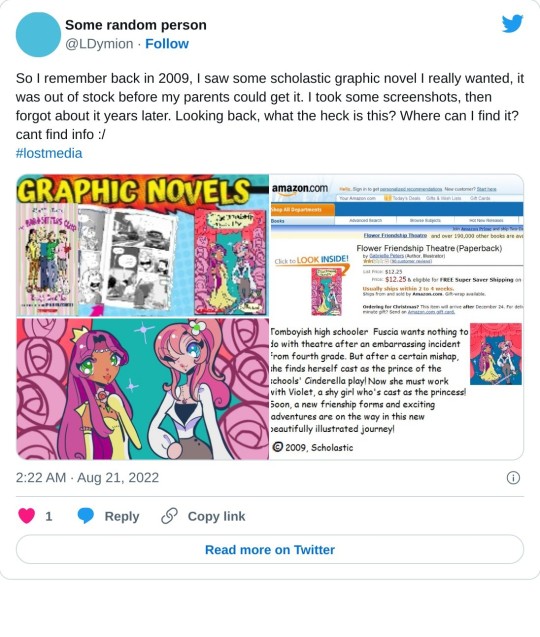
Anyone know about this book?
2 notes
·
View notes
Text
The legacies people leave behind in you.
My handwriting is the same style as the teacher’s who I had when I was nine. I’m now twenty one and he’s been dead eight years but my i’s still curve the same way as his.
I watched the last season of a TV show recently but I started it with my friend in high school. We haven’t spoken in four years.
I make lentil soup through the recipe my gran gave me.
I curl my hair the way my best friend showed me.
I learned to love books because my father loved them first.
How terrifying, how excruciatingly painful to acknowledge this. That I am a jigsaw puzzle of everyone I have briefly known and loved. I carry them on with me even if I don’t know it. How beautiful.
~Edit~
Yikes guys I didn’t expect this post to blow up.
I’m grateful it did though. Looking at all the comments and tags really takes a stab at my heart because it just shows how wired we are for connection. If life has any meaning, then it’s that.
This concept really sunk its teeth into me as it reassures the notion that no one is ever truly gone. Parts of them just change into you.
That teacher I talked about inspired me to become a teacher myself. This was my first year teaching. Here’s to a new generation of curved i’s.
#love#platonic#friends#friendship#lots of love#lots of feelings#spilled heart#spilled words#loss#grief#literature#spilled poem#words typed#writblr#lost friendship#i’ll love you forever#angst#lots and lots of angst#like so much#sad vibes#i'm sad
137K notes
·
View notes
Text
Please tell me i'm not as forgettable as your silence is making me feel.
#feelings#literature#love#love quotes#poetry#quoteoftheday#romance quotes#music#poem#lovequote#song#emotions#thoughts#inner thoughts#heartbreak#late night thoughts#feeling#i feel sick#bpd feels#connection#vulnerable#i feel empty#in my feels#breathe#partner#lost media#keeper of the lost cities#lost#tad the lost explorer#john locke
3K notes
·
View notes
Text

- reyna biddy
#fall in love#love poem#lovers#poetry#poets on tumblr#universe#literature#alternative#positive quotes#positive thoughts#feelings#deep feelings#thoughts#emotions#heartbreak#lost love#breakup#self healing#healingjourney#forgiveness#strength#growth#authenticity#gratitude#life lessons#thinking
3K notes
·
View notes
Text

Katherine Larson, from Radial Symmetry; “Gardens in Tunisia”
[Text ID: “There are days that walk through me / and I cannot hold them.”]
#katherine larson#lost#excerpts#writings#literature#poetry#fragments#selections#words#quotes#lit#typography#poetry collection#american literature#american poetry
25K notes
·
View notes
Text
On lost love



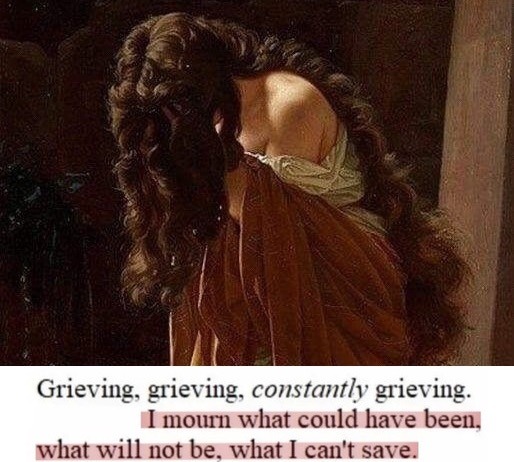
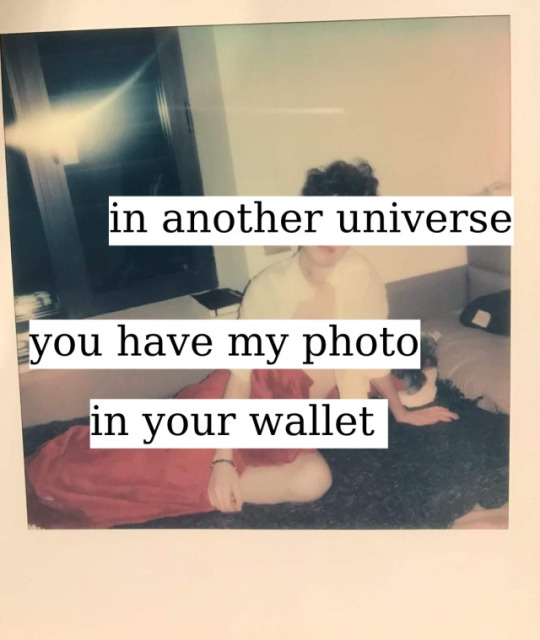

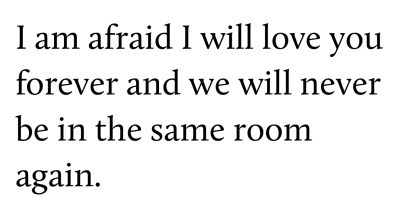
Vita Sackville-West, Everything Everywhere All at Once, Lee Martens, ?, ?,?, Clementine von Radics
#dark academia#web weave#web weaving#everything everywhere all at once#waymond wang#beau taplin#clementine von radics#vita sackville west#literature#kafkaesque#letters to milena#franz kafka#lost love
1K notes
·
View notes
Text


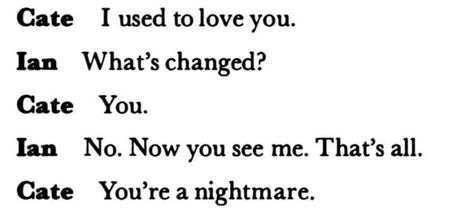



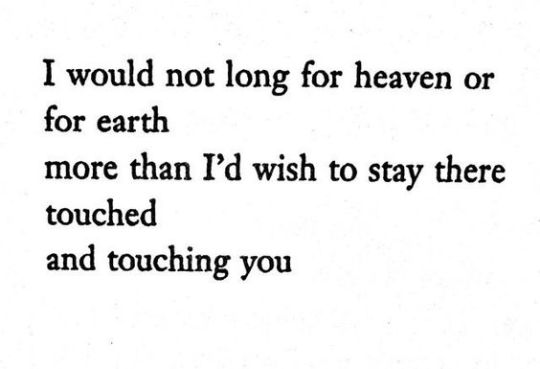


@/coffee-cosmos // ? // blasted, sarah kane // ? // henry and june, anais nin // ? // a poem for haruko, june jordan // cassandra: a novel and four essays, christa wolf // a little life, hanya yanagihara
#web weaving#web weave#parallels#lyric parallels#fragments#poetry fragments#unrequited love#unrequited feelings#lost love#on love#love#heartbreak#heartache#poetry#love quotes#quotes#love poem#dark acadamia quotes#literature#lit
3K notes
·
View notes
Photo

John Milton, Paradise Lost, Book 1
[originally published 1667]
#truer words were never spoken#john milton#literature#paradise lost#words#quotes#academia#dark academia#quote#lit#heaven#hell#books#books and libraries#reading#quote of the day#bookworm#book quotes#prose#booklr#bibliophile#excerpt
3K notes
·
View notes
Text
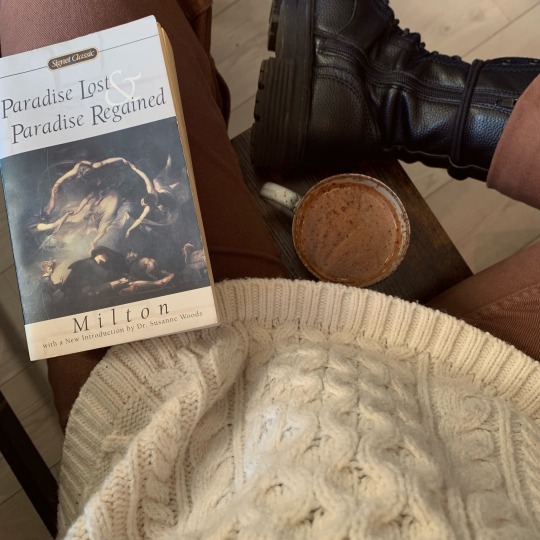

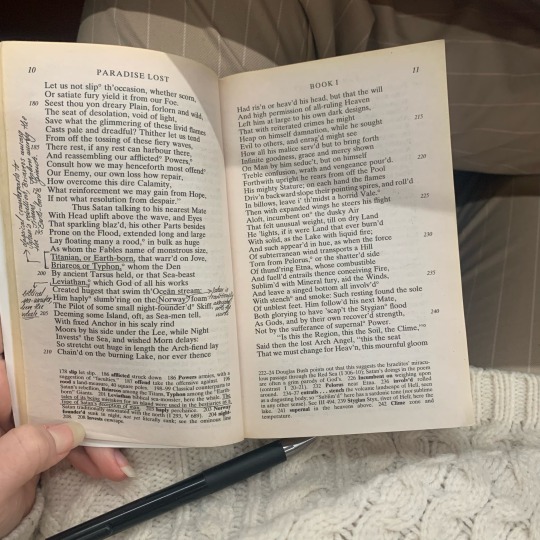



I want the blissful sweetness of doing nothing
#dark academia#light academia#classic academia#aesthetic#academia aesthetic#dark academia aesthetic#light academia aesthetic#romantic academia#classics#paradise lost#university#uni life#dark academia blog#dark academia books#romanticism#coffee and books#books#english literature
7K notes
·
View notes
Text
Lost World Literature vs Lucian's Library Winners
#Ancient World#Mythology#Folklore#Lost Literature#Time Travel#Lucian's Library#The Sandman#Terry Pratchett Gnu#Terry Pratchett#Gnu
53 notes
·
View notes
Text
Addard stood, rigid, amongst the ashes of her great work. Her eyes were red - not from weeping, never for the Emperor’s daughter, his favored child, but from the soot. The ash. The smell of things burning that should not burn.
Just a few yards beyond, a group of men knelt in the ash, prostrate before him as if they were kow-towing to some lord of Old Cathay, which, perhaps in some sense, he was.
“This, all of this, you brought upon yourself,” the Emperor of Terra fixed the kneeling men with a face devoid of emotion, eyes like the silence before a coming storm. “This… all of this.” The captives could not face his gaze.
She had seen Barbarian warlords stand against an onrush of landships and fail to meet the Emperor’s gaze. The armies under the command of these men had resisted her Legionaries for longer than anyone had estimated they might. Others had of course resisted longer. But these men, their soldiers…the Lords Marshall had confidently predicted a victory in a matter of weeks.
Her father, the Immortal Emperor of Terra, turned his gaze to her. It did not soften, but it was more sympathetic. The gaze of an approving father sharing an uncomfortable necessity with a favored child.
“How many?” He asked.
“Twelve hundred. Much of Fifth Cohort. Mourned By All.”
“Mourned By All,” the Emperor repeated, nodding his approval. “And theirs?”
“Difficult to say. We believe we have eliminated -“
“Murdered.” Spat one of the prostrate men. “You murdered them.” He was a smaller man, wiry of frame. He was still looking to mud beneath him, but his words were bold enough.
The Emperor looked to the man. “And who are you?”
The man stiffened. “What does it matter? You’ll kill all of us two. Make a desert of this place and call it peace.”
“Perhaps,” the Emperor replied. “Perhaps not. Your people showed incredible bravery. And to take as many Legionaries with you as you did… Still, as I say, you are ultimately responsible for this.”
The little man shook his head. “I may be smart enough to show deference. Too fearful to accelerate my own demise. But I won’t be lied to. Too many of my own people died to stomach this.”
“Again, I ask,” the Emperor replied patiently, “who are you to speak so boldly?”
“I am a soldier. That is all that matters.”
“And the others?” The Emperor gestured to the nine other men there in the dirt. “Are they not your leaders? Your politicians?”
“The ones dressed like soldiers,” the man replied, “are not always soldiers. Some are both. Some are good men. All did their duty, which is more than I can say for our King, or our Nobles. But why does that matter? You have blamed us, all of this, for this atrocity of a war.”
“You were offered peace. Autonomy.”
The captive growled audibly, “My people have been conquered, reconquered, and then conquered again. Each time we have thrown off the yoke. We have no desire to be your servants.”
“I did not offer you serfdom or penury; I offered you autonomy. I spoke to your King. I told him what we could do for your people.”
“You said nothing to our people.” The captive replied, “you spoke to a fratricidal, drunken, Hetman. He does not speak for my people.”
“And whom,” the Emperor approached the group, waving his own Praetorians aside, “do you speak for?”
This angry little man, Addard judged, was a brave man. He was also a dead man. There was no question of this. Her father could be kind, but he was on a crusade; and that mission could ill afford such complications.
“I speak for myself. I speak for the men you killed. It is I who killed two score of your own. And I who would kill two score more.”
“Why fight for this king, O Slayer of Legionaries?”
“I fight for my people against your daughter, the burner of worlds. I fight for my people against your Legionaries, the ravagers of cities. I fight for my people against you, defiler of altars. The king is dead. Dead by his own hand. He fought for no man but himself. May he forever choke on the poison he drank.”
“Your people practice an irrational faith.” The Emperor’s voice was stern. “They are dominated by superstition and fear.”
Addard felt a tang of regret. She kept her mouth shut. He would reveal himself when ready, she knew. Not before. If she could only share the message…
“Kill me if you must, oh Emperor of Terra. But know this: I will not have you blaspheme my gods. They are foreign to you. You have not known them. Do not presume to judge what you cannot see.”
“There is noting to see,” Addard found the words forming. “For, your gods are false.”
“All gods are false,” the Emperor replied. “Science tells us…”
“Science tells us a great many things,” the little man growled, “many useful things. And every few decades, it says new things. Centuries ago, it told us men could not fly. And now they can. That the Old Earth was flat. And now it is not. That human beings would never settle beyond our womb world, and yet here we are.”
“This is the nature of science,” The Emperor countered, “any search for the truth must evolve as it grows.”
“The truth?” Now the dissenter laughed quietly, “the truth. Tell me, Emperor of Man, as some call you, how many names have you born?”
“Many,” the Emperor acknowledged.
“And which is your true name?” The little man countered. “I am Sextus. I have always been Sextus. And you are?”
The Emperor did not answer.
“A man of learning,” this ‘Sextus’ continued, “must accept that very little can be proven true. That very little can be proven false. Our understanding is merely the lens through with which we view reality. I place my faith in things that are true to me, but cannot be fully understood by you. I have felt things, seen things…”
“Personal experience,” the Emperor replied, “is not proof.”
“And being open to the wisdom of both science and the undefinable means recognizing that the worth of things cannot be judged solely upon our limited capacity to prove them true. You came to my home. You promised a thousand, thousand little things. And when we failed to bend the knee to you, you did not stop to consider why. You simply, “ he raised his head and nodded toward Addard, eyes still downcast, “loosed your dogs. Your bullets, bombs, and bayonets killed tens of thousands. The common regiments who fought alongside your supermen robbed and raped as many as the good ones tried to save. You are a murderer. This much can be proven.” Sextus shook his head, ruefully, “the reason for it. The reason cannot.”
The Emperor considered the man. “Stand up, Sextus.”
“At last we come to the killing, then.” Sextus sighed. He stood, shook off the dirt, and made a point of wiping the filth from his uniform. “If you are a man of honor,” said Sextus, “you will tell my mother, should she still live, that Sextus Cornelius Castus died with dignity. I shall give you proof.” He focused his eyes on the Emperor. “Are you a man of honor?”
In her life since coming to join her father, Addard had never seen an ordinary man hold his gaze for more than a few moments. To gaze directly into the eyes of the Emperor was to see beautiful and terrible things. She could do so. She had learned. So could her brothers. So could her…
“And if I ordered my praetorians away,” the Emperor said, his voice firm, “and told them to leave us for fifteen minutes. What would you do?”
“I would make you drown in your own blood. Or drown in my own, rather than be your boot lick.”
The Emperor nodded approvingly.
“Then come with me, Sextus Cornelius Castus, and I shall show you the reason.”
- Sextus is reunited with the Emperor, “The Stars Asunder”, August Richter (1937/38)
#malal#malice#askmalal#stars asunder#lost literature#grimdark#pulp science fiction#dieselpunk#interwar period#gorcharov
3 notes
·
View notes
Text
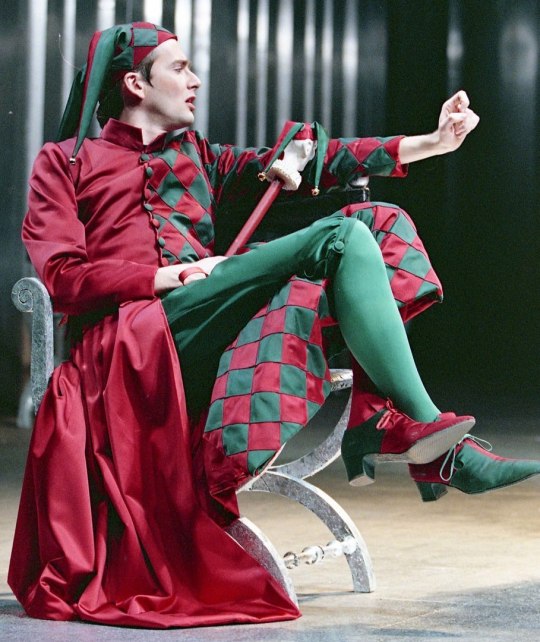
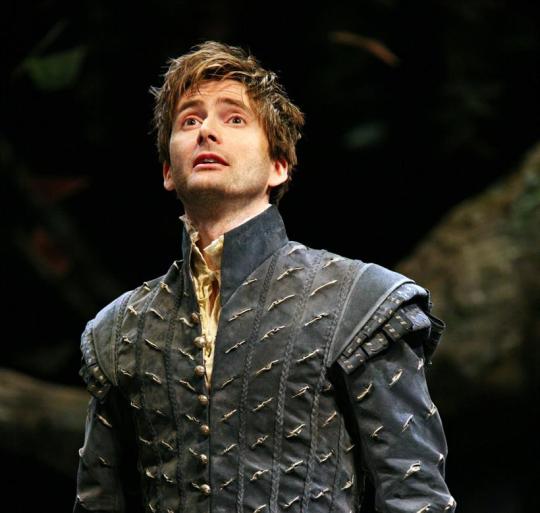

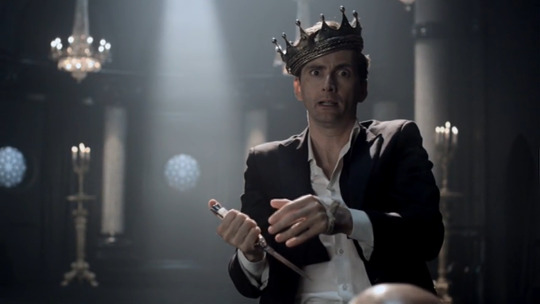
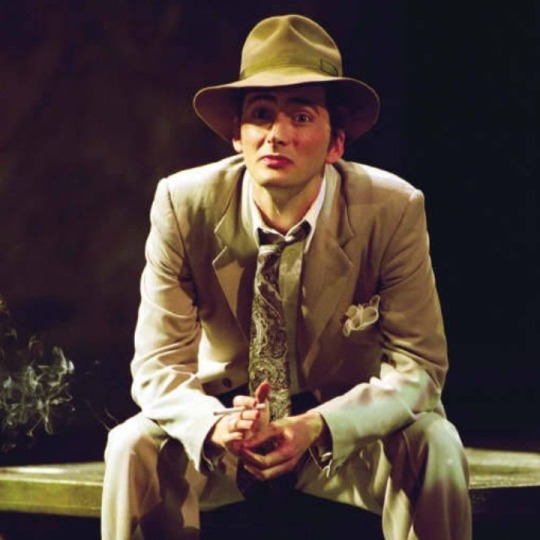




David Tennant in Shakespeare plays
[As you like it , love's labor lost, Richard II, Hamlet, The Comedy of errors, King Lear, Romeo and Juliet, much Ado about nothing, Macbeth]
P.s. he had also been in Edward III as Edward the black prince and the midsummer night's dream as Lysander/flute but I couldn't find any pictures from those plays.
#shakespeare#david tennant#literature#theatre#as you like it#macbeth#hamlet#love's labour's lost#much ado about nothing#romeo and juliet#richard ii#the comedy of errors#king lear#edward iii#a midsummer night's dream#i updated the Macbeth photo because it's fuckin stunning
1K notes
·
View notes
Text
My therapist was so real for saying the meaning of life is found in connection.
People hug their friends when they meet up and hug them a little tighter when it comes time to say goodbye. My grandfather rebuilt the broken rocking horse my grandmother had as a child, a gift from her father. There's an indescribable ache that goes along with seeing someone you used to know intimately, the becoming of a common stranger. Coincidences that bind, one time I got an uber and the driver used to live in my home before me. It was the last place he saw his father alive as a child and he nearly cried when I told him the walls were still the same colour.
Has anyone ever gotten over their childhood best friend? Is that alone not a testament to the fact we are more than blood and bones.
It's all about connection, friends.
#writblr#spilled heart#writing#friendship#love#platonic#spilled words#words typed#grief#thoughts#spilled poem#family#literature#friends#lost friendship#family trauma#grief also doesn’t mean loss through death#loss#romance#connection#connectivity#meaning of life#life goes on
12K notes
·
View notes